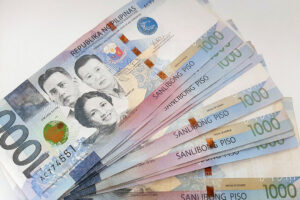




Policy Rate Updates: BSP outlook — cloudy with a chance of rate cut
 DOWNLOAD
DOWNLOAD

January Economic Update: Growth slows, prices rise
 DOWNLOAD
DOWNLOAD

Inflation Update: Up, up, and away?
 DOWNLOAD
DOWNLOAD


BSP launches credit scoring model

THE BANGKO SENTRAL ng Pilipinas (BSP) has launched a credit scoring model that is expected to enhance credit risk assessment by lenders.
The Credit Risk Database (CRD) Scoring Model was developed as part of a technical cooperation program between the BSP and the Japan International Cooperation Agency (JICA).
It is expected to serve as an additional tool that lenders can use to analyze the creditworthiness of micro-, small-, and medium-sized enterprises (MSMEs).
The CRD utilizes a data-driven approach to boosting lenders’ confidence in financing MSMEs, especially those without credit history or enough collateral, the BSP said.
“The CRD scoring model will [not only] contribute to bridging the funding gap to MSMEs, but it will also enhance credit risk management among financial institutions,” BSP Governor Felipe M. Medalla said at the launch event on Tuesday.
Sakamoto Takema, chief representative of JICA, said the CRD can contribute to the BSP’s goal of enhancing access to finance under the National Strategy for Financial Inclusion.
“The overall goal is to enhance the capacity of credit risk assessment of each financial institution, and to promote risk-based lending rather than collateral based lending. It will strengthen the country’s financial system by expanding and streamlining lending to MSMEs,” Mr. Takema said.
Mr. Takema said JICA has agreed to extend the CRD project period for another year and will extend support for phase 2.
The CRD project was launched virtually in December 2020 at the height of the pandemic. The project has expanded with the help of 32 participating rural and universal and commercial banks.
BSP Deputy Governor Bernadette Romulo-Puyat said the CRD is a tool that may significantly expand credit access of small and medium enterprises.
“MSMEs make up 99.6% of business establishments in the country providing 64.7% of employment to the country’s workforce and contribute about 35.7% to the country’s gross domestic product,” she said.
Mr. Medalla noted that there is a “one-size-fit-all policy” towards lending to small businesses in the country, citing the Republic Act 6977 or the Magna Carta for MSMEs.
“A highly specialized Japanese bank for instance — [which] has less than a hundred employees because they are focused on lending to Japanese firms in the Philippines — are being told to lend to MSMEs and agriculture,” he said, adding that the law becomes a “tax” on foreign investors.
Mr. Medalla said that banks have opted to incur penalties for noncompliance instead of taking on the risks associated with lending to small businesses.
Lenders are mandated by the Republic Act 6977 or the Magna Carta for MSMEs to allocate 10% of their credit portfolio for small businesses to boost the sector — 8% for micro and small enterprises (MSEs) and 2% for medium-sized enterprises.
In April 2020, the BSP allowed MSME loans to be counted as part of banks’ reserve requirements in a bid to boost lending to the sector at the height of the pandemic. — By Keisha B. Ta-asan
This article originally appeared on bworldonline.com





 By BusinessWorld
By BusinessWorld